| |
"Towne radically altered Ponicsan's Camus-loving protagonist with his beyond-beautiful wife and recast him as a more ultimately com- promised man, adding him to the gallery of unformed underachievers that populates his screenplays: J.J. Gittes in Chinatown, George Roundy in Shampoo, Mac in Tequila Sunrise. All of these men are compromised in their need for the means to survive." |
| |
Lennon, E.: The Screenplays of Robert Towne 1960-2000.
Dublin Institute of Technology, 2009 |
In the long gone days when movies were green lit based on the quality of their screenplays, rather than their association with a previously known TV show, novel or indeed previous movie, iconoclasts flourished. Yes, it's my same stuck record promoting the 70s but it really was a terrific decade for quality cinema. Filmmakers like Hal Ashby were given opportunities to shine. The Last Detail is a glorious example of Hollywood taking chances and reaping the rewards. It features a career Navy grunt and his partner charged with escorting a very young sailor to a prison that will incarcerate him for eight years for stealing forty dollars. Hackles raised yet? Forty dollars... Yeah, but it was forty dollars from the collection plate for a charity supported by the wife of a Navy bigwig. As I have said many times, 'context is everything'. So the poor bastard doesn't so much get the book thrown at him but the whole fecking library. He has as much life experience as an infant mayfly (zoology joke there. It's OK, it's the only one) so his three or four day guardians decree that he will live more in that free time before succumbing to his fate in the Marine prison. And what a few days...
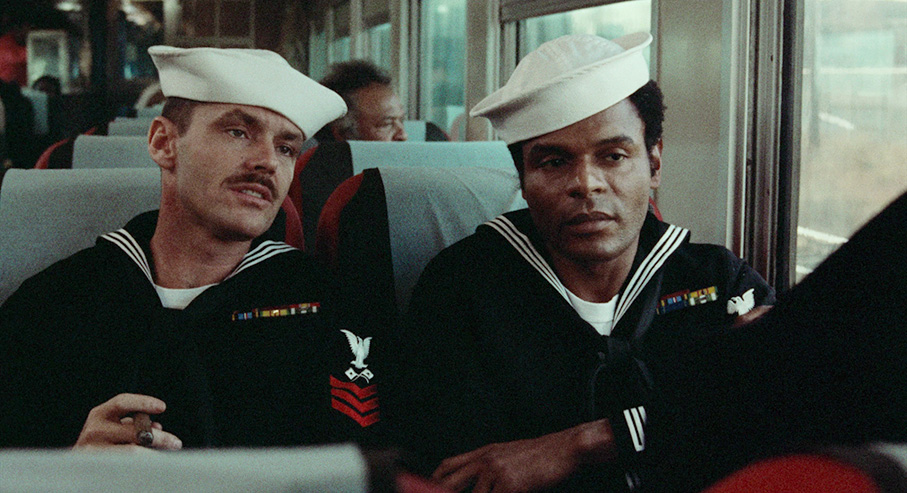
Jack Nicholson was smack in the middle of carving out his career defining performances in 1973. Once older, the iconic actor wore certain parts better than others, often cast for his 'Jack-ness' rather than his talent for playing characters, but here as Signalman 1st Class Billy L. "Badass" Buddusky, a hard as nails, cocky and sympathetic grunt (he'd slug you if you called him sympathetic) his performance is as true as it could be. In the scene in the small hotel room, when he's trying to get a rise out of his young charge, we are witnessing the birth of the Nicholson patented "Here's Johnny" losing-it performance. There's a moment of loss of control in a car in his earlier Five Easy Pieces (another stand out Nicholson performance and a wonderful film in its own right) but here, trying to get the boy to hit him, to show some emotional intensity, he smashes the lamp and punches the wall. In an incoherent rage I could just make out the word 'grunts' and a few cuss words but he is utterly believable. Lying on the bed while the boy takes an epic pee, he tells a story that has him and his partner in hysterics and you just felt that this was reel beer they'd been drinking for hours to deliver such extraordinary naturalness. You laugh with them as if you were in the room too. Nicholson is not a tall man but his wiry, energy-stoked character makes him stand out and you really can't keep your eyes off him.
Matching him beat for beat is 'Mule', or Gunner's Mate 1st Class Richard Mulhall played by Otis Young. Mule plays the pragmatist, the by-the-book player and you're never in any doubt that they will deliver this poor schmuck to prison because the two men are lifers – the Navy being what 'made' them. Some men and women flourish in a more ordered and rigid society. I can't see Otis Young in any other movie without this sentence flying through my mind... "I hate this fucking, chicken shit detail." I, on the other hand, adore it. Rounding out the threesome is an early role for Dennis' older brother, Randy Quaid. He's superb as the mild but hulking Seamen Meadows whose young life has been stolen from him by Naval authorities out of spite. He was rightly given an Oscar nomination for this performance but he's probably most recognised for his role as the redneck pilot who starts the world's fight back in the original Independence Day. The pathetic nature of his crime is not lost on his guards but along the journey there's good time boy Nicholson, stoic Young and the hapless Quaid.
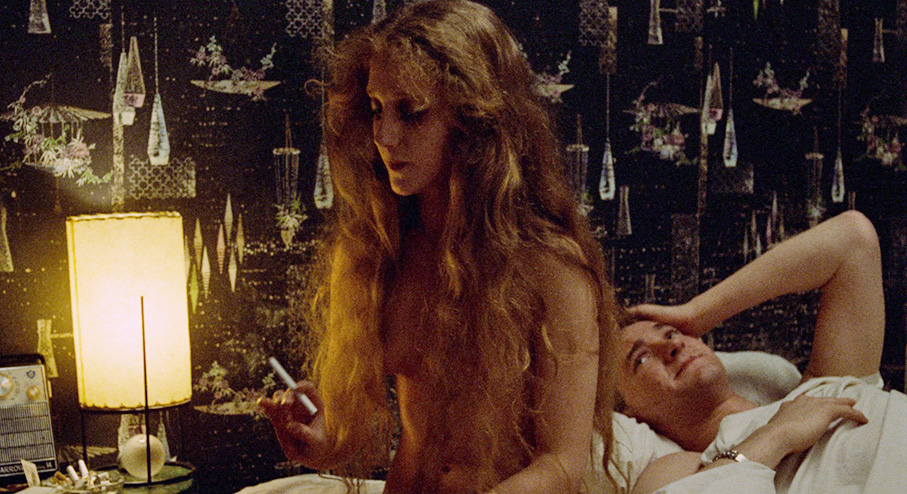
The supporting cast do their bit to make the film memorable. Clifton James, that stout character actor so striking in Live and Let Die ("Secret agent? On whose side?") plays the Master At Arms who sends our boys to do their 'chicken shit' detail. Then there's Carol Kane who impressed as a short term Alvy Singer girlfriend in Annie Hall. She was also the Ghost of Christmas Present memorably beating the crap out of Bill Murray in Scrooged. She plays the 'Young Whore' as it says in the credits with a beguiling sensitivity. The post coital scene of her sitting naked assessing her own charms while Quaid gently strokes her arm, spellbound by her, is charming for its staging and performance no matter how immoral this may have played out in anyone else's hands than Ashby's. You have to remember Ashby also directed Harold and Maude, a film I could hold in no higher esteem. Finally there's the 'grunt' that plays a power game with Nicholson's Signalman. Played by one of my favourite American character actors, Michael Moriarty, he goes from superior to reluctantly acquiescent in a few moments, outplayed by Nicholson and Young.
The film is crammed with memorable moments; how Quaid and director Ashby came up with how to perform and stage the premature ejaculation scene is beyond me but it's just brilliant; watching Nicholson trying to erect a folding bed that just does not want to cooperate is priceless. There's not a wasted scene or word and the inexorable march to a living hell (marines hate seamen, remember?) is pacey and compact and Nicholson gives you the impression he's making it all up as he goes along – that's great writing and acting. His 'Bad Ass' Buddusky always seems a gnat's hair from full on hysterics or a temper outburst that would floor a gorilla. His swagger and confidence is never dented (it takes a hit while he's trying to chat up Nancy Allen at a party by being appallingly smutty) even though the character is not that bright and his worldview pretty narrow. Here's a man who picks fights in toilets, because we all know that seamen despise the marines, as mentioned, the hate travels in both directions), and frequents brothels. And when he does lose it, the event stays with you. Probably the most famous moment of the movie (that I won't spoil) happens in a bar when the three are trying to get a drink. But again, it's another hugely quotable line and it's undiluted Nicholson. Since making such an impression on the back of a Harley in Easy Rider four years earlier, Nicholson was still experimenting and taking chances. And that is always entertaining.
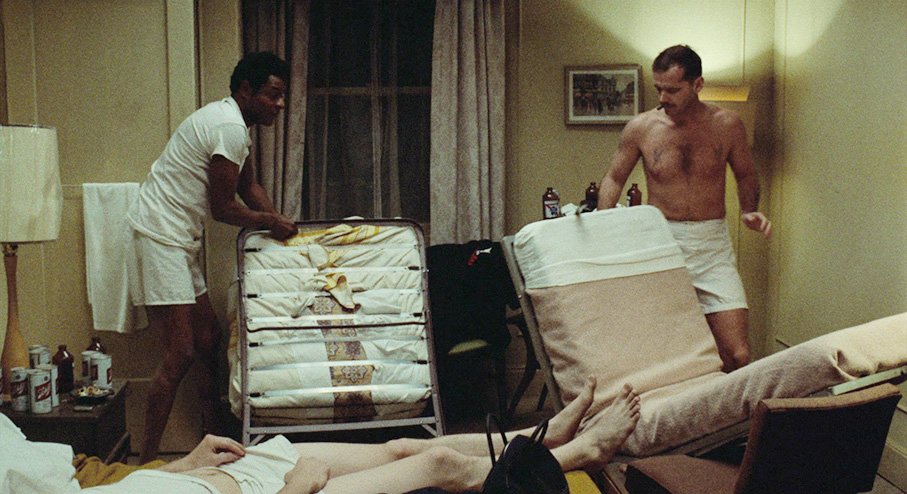
Hal Ashby's work is about as unflashy as it could be because all of his talent is concentrated on pushing to get the characters and scenes to life and he achieves this in spades. The chap with the oval face and facial hair reacting to Nicholson's darts playing in front of him is Ashby himself. There is no fancy camerawork and no editorial tricks or tropes. There are a few interesting mixes from one scene to another and a POV shot that's unusual in that it seems to be shot by the camera person randomly moving left to right and pointing at the floor. Who's POV is that? But this is an actor's picture and it's straightforwardly directed as such and that's a good thing. Ashby's decision to use the talents of composer Johnny Mandel was also sound. He rounds up and organises a soundtrack unlike any normal soundtrack. There are no cues over most of the movie (a lot of music plays from sources in the movie itself) but when 'American Patrol' pipes up, it is intrinsically linked to Nicholson's character and it's such a famous piece you'll find yourself humming it as it comes up several times in the movie.
The Last Detail was written by one of the very best screenwriters Hollywood boasted at that time. In screenwriting circles, Robert Towne's Chinatown is the art's very own Casablanca, an example of its kind held up for others to appreciate. In Detail, his language is strong, credible and funny, his characters vivid and robust and his structure is sound but there's no doubt this is a comedy and Nicholson is the primary conduit for humour. Nicholson's reaction as Happiness Group actress Gilda Radner recounts her penchant for musical instrument is priceless. His pee story will have you laughing despite yourself and watching him trying to get off with Nancy at the party (Robocop's Nancy Allen) is excruciating. I mean does he really like his naval uniform and I quote "because of the way it makes your dick look." Way to go, Bad Ass! But the film has its seriously dramatic side. Towne is a master of subtext and the pivotal scene for me is the one that seems so inconsequential (this is why Towne is a master). It is a scene of three men, freezing their asses off trying to light a fire to cook some hot dogs and one of them has forgotten the buns... Nicholson's performance alters subtly and the enormity (in the true sense of 'the great or extreme scale, seriousness, or extent of something perceived as bad or morally wrong') of Meadow's fate suddenly shuffles to the front of his character. It's a classy bit of acting that soon gives way to violence coming from his sense of impotence, hurt and rage at the unfairness life can dish out. But, boy that ending makes you feel it as well as the bitter cold throughout. If you feel you need another layer of clothing while you watch it, I won't blame you one bit but do watch it. It's a hoot.
In a bit of an about-face on previous comments about how films you remember as looking gritty being transformed on Blu-ray, The Last Detail is a film that seems destined to look gritty irrespective of the delivery format or the work of the restoration team. This is primarily down to then first-time cinematographer Michael Chapman's decision to shoot the film by largely available light with as little supplementary lighting as possible, presumably on high-speed stock, giving the film a semi-documentary aesthetic that perfectly complements the naturalism of the performances. There are precious few bright colours here, but the earthy tone of the interiors is consistent and palette does enliven when the boys hit the streets in daylight, and the night-time neon lights and shopfronts are attractively rendered. The contrast is punchy and the black levels strong enough to sometimes suck in detail in darker scenes, but I seem to remember this is how the film looked on the big screen (it's been a long time...). Detail and sharpness are not reference quality but still impressive given the restrictions of the chosen aesthetic, a fine level of film grain is visible, and the image is clean of any traces of dust and damage. Personally, I'm well happy with this.
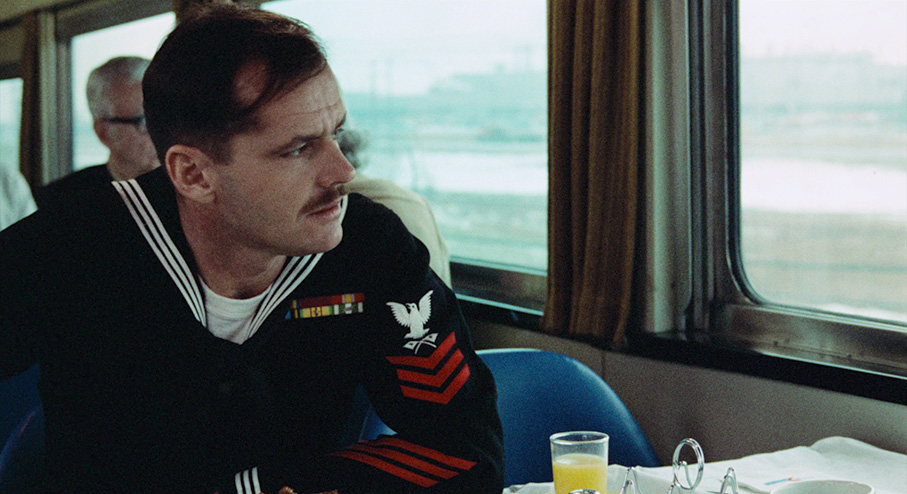
The Linear PCM 1.0 mono soundtrack is clean and free of any hiss, fluff or clicks. The dialogue is always clear, no mean feat when you consider that it was all recorded on location with no post-production ADR work. Johnny Mandel's score is nicely reproduced, and although there are some inevitable range restrictions, this again works for the film's semi-documentary aesthetic.
Optional English subtitles for the deaf and hearing impaired are included, and there's a Linear PCM 2.0 mono music and effects only track for fans of such features.
1976 TV Syndication Cut of the Film
A treat for movie masochists, this is the version of The Last Detail prepared by editor Robert C. Jones for American TV transmission, which means it's cropped to 1.33:1, presented in standard definition with fluffy quality sound, and has all of the swearing either cut, disguised or replaced with words from elsewhere in the film. It's also 9 minutes shorter than the theatrical cut. It would take a dedicated glutton for punishment to watch the whole thing and note all of the alterations, so hats off to Jeff Billington, who clearly did just this for his detailed and enthralling essay in the accompanying booklet (more on that below). For my money, the best way to approach this extra feature is to pick a favourite sweary scene, watch the theatrical cut first, then run the same sequence from the TV version, which should have you slapping your forehead in horror. As editor Robert C. Jones remarks in his interview on this disc, these cuts completely emasculate the film.
An Introduction by Alexander Payne (5:11)
Citizen Ruth, Election and Sideways director Alexander Payne, who also directed this film's lead player Jack Nicholson in the 2002 About Schmidt, provides an overview of Hal Ashby's 70s work – which he believes captures the spirit of the decade as well as that of any other director – and reads from programme notes he prepared for a screening some years earlier of what remains one of his favourite films.
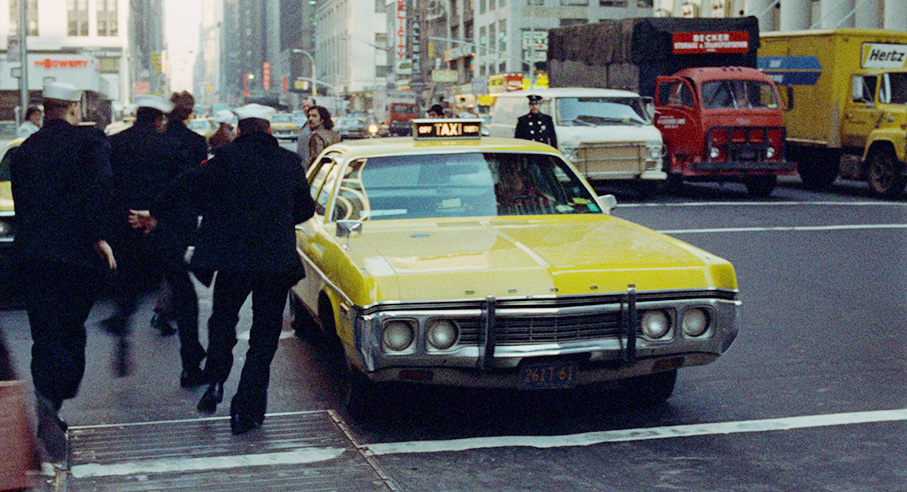
An Interview with Michael Chapman (3:55)
A brief interview with The Last Detail cinematographer Michael Chapman, for whom this was his first job as director of photography and who seriously underplays his own contribution, claiming that while the decision to shoot primarily in available light contributed to the film's air of almost documentary realism, it also helped to disguise the fact that he didn't really know what he was doing. "It's a marvellous movie," he says at the end, "but not because of my lighting." Chapman, if should be noted, went on to photograph Taxi Driver, The Front, The Wanderers, Dead Men Don't Wear Plaid, The Lost Boys, and a whole heap of other fabulous looking films, and was twice nominated for the Best Cinematography Oscar for The Fugitive and Raging Bull.
About a Trip (16:26)
Produced by Robert Fischer for Fiction Factory, here Alexander Payne elaborates on what makes The Last Detail such an important and special film, and recalls working with Jack Nicolson on About Schmidt and wanting to tap into the sort of performances he gave in the 1970s, a golden period for American cinema whose extraordinary output was what made him want to become a filmmaker in the first place. He highlights some of his favourite scenes, the use of long dissolves in Ashby's films and briefly discusses the one element about the film he doesn't care for. There's even brief talk about a sequel titled Last Flag Standing that exists in screenplay form and has apparently been acquired by Richard Linklater.
A Search for Truth (20:35)
Another Fiction Factory piece, this interview with Robert C. Jones (whose credits include recent Indicator titles, Guess Who's Coming to Dinner and The New Centurions) is an enthralling watch and peppered with revealing memories and anecdotes. He initially turned down the offer of working for a director who had the reputation of being a little crazy, but when the original editor stumbled and he was asked to come in again, he was blown away by the truth and energy of the footage and immediately jumped on board. He talks about specific editing decisions, including the use of slow dissolves to shorten a key conversation (you'll know which one if you've seen the film), and reveals that the first assembly cut ran for four-and-a-half hours and that Ashby give him his first break in screenwriting. There's plenty more of interest here.
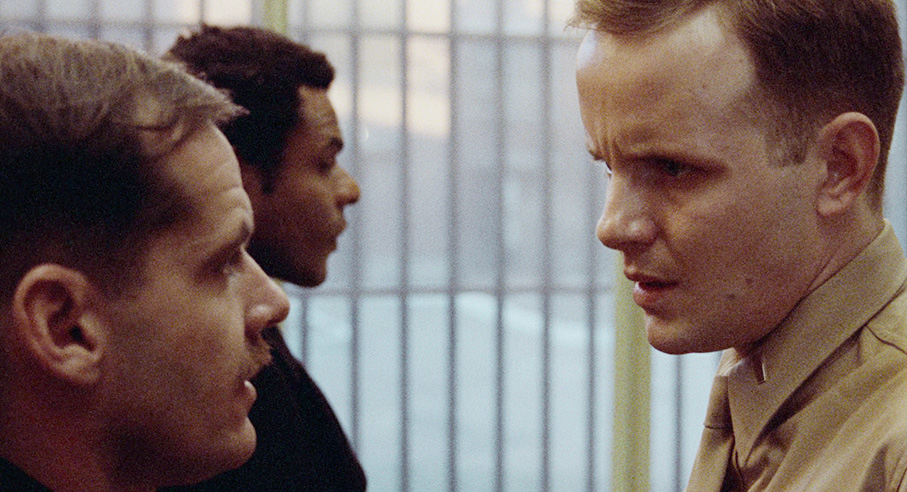
Gallery
27 manually advanced slides of production and publicity stills and promotional material, though four of them are of different portions of the same poster, presumably to allow you to read the positive press quotes clearly.
Theatrical Trailer (2:58)
A rough-and-ready trailer that feels more like a first assembly than a final edit.
Booklet
'Badass Blues' by Michael Pattison is an essay that reveals the context in which the film was made and presents such production information as the generosity of Nicholson as an actor, Ashby's 'laissez-faire' attitude to directing and the trouble the film ran into censorship-wise. It's a terrific, solid piece of writing but I would strongly suggest you see the film before reading it. The Last Detail can't really be spoiled (there are no "I am your father!"s here) but it would be nice to encounter the whole movie relatively uninformed of its content.
'The Last Detail: The 1976 Television Cut' by Jeff Billington tells of a celebrated bad language rife movie and how it was emasculated for a TV slot. The detail in the piece is admirable and the way in which whole scenes were butchered just so the offensive words would never fall on ridiculously sensitive ears... It struck me that censorship in the US (and perhaps in the UK too) was just another outgrowth of the thirst for the mighty dollar. We cannot afford to offend anyone because if they don't watch, they won't see the ads... Can censorship just be another buttress to capitalism? That's an essay, right there!
There're a few more bits of information about the presentations and a rather fetching close up of Hal Ashby on the back (I'm used to seeing the older, post-drugs director).
A superb example of what made the 1970s such a thrilling period for American maverick cinema is given the sort of treatment here it so richly deserves. A fine transfer and a good selection of quality extras make this another absolute must-have from Indicator. Great writing, great performances, great direction, great disc. Highly recommended.
|